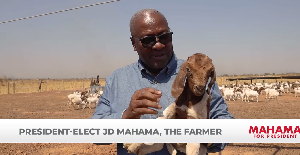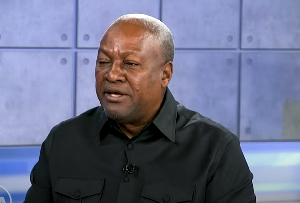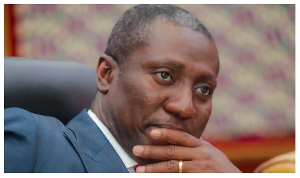Newmont Ghana Gold has begun rolling out a substantial investment into its activities in the country subsequent to approval of an Investment Agreement between the Republic of Ghana and Newmont Mining Corporation in December 2003.
The object of this investment is the development of two new mines, one located at Ahafo, in the Asutifi District of the Brong-Ahafo Region and the other at Akyem in the Birim North District of the Eastern Region. These are Greenfield projects without a prior history of mining activity.
A massive effort in community relations work that began prior to the grant of government approval is still ongoing in the concession areas with the aim of developing and implementing sustainable community livelihood enhancement programs alongside mine development. This is of critical importance because of the challenge of relocating and resettling people residing in areas required for mining operations.
Mining and Local Communities
Mining activities impact diverse communities differently especially when undertaken on a large scale. Artisanal mining has been going on in Ghana for hundreds of years but industrial mining activities commenced just about a century ago. Community reaction to mining has evolved over this period and while some communities welcome mining activities others resist it actively. The Newmont Approach The observed impact of industrial mining on the livelihood and environment of affected communities informs the response of host communities to any new mining initiative and has contributed to the available knowledge of its consequences, favourable or otherwise. Newmont understands this and has committed to collaborating with communities in its concession areas to achieve socially and environmentally responsible mining operations as a responsible partner with a proven and verifiable track record of success on similar projects in other parts of the world.
The challenge of securing community acceptance of mining activity is a global one and not peculiar to Ghana. The accumulated experience acquired by Newmont in surmounting this challenge has been distilled into a ?values statement?, guiding principles that order Newmont?s project implementation globally. Beyond the value statements Newmont has developed a ?social responsibility policy? that guides its interactions with host communities. The purpose of developing and implementing this policy is to obtain what Newmont describes as a support and goodwill (I.e ?social license to operate?) from communities impacted by its activities.
Newmont realises that its long-term success is tied to managing its broader social responsibilities to its host communities responsibly while creating value for its stakeholders, and this knowledge guides the company?s approach to community relations activities. So what precisely is Newmont doing to assure its acceptance by and into the communities that it impacts in Ghana? Accountability When Mr. Wayne Murdy, Chairman and CEO of Newmont Mining visited Ghana to conclude the investment agreement, he took time to meet with Chiefs and communities where Newmont is to mine and stated clearly the company?s intentions. The company provided its value statement translated into local languages to the communities and challenged them to hold the company to its word.
This was no doubt a novel approach to dealing with a perhaps intimidating commercial enterprise, particularly one that has government backing, and Newmont realised the communities were most unlikely to take up this challenge (unable even) without some facilitation. But this is the way Newmont does business - in partnership with the local community- and the company took the initiative to hire external consultants to facilitate the community interaction. A ?knowledge, attitude and perception study? was undertaken to determine the extent of previous knowledge in the communities about mining and the attitudes to the prospect of mining taking place. Culturally sensitive communications approaches are employed. The communities are thereby informed and empowered to participate in determining the direction of their own development.
The success of this approach hinges on openness and frankness in dealings with the host community. The company has sought to reach out proactively to the various stakeholders - communities, regulatory agencies, media and NGO?s - with a view to obtaining feedback on its activities so as to conduct its operations with the required social sensitivity. Reaching Out The foremost step in this approach involved reaching out to the local communities, those impacted most as a result of dislocation of homes, farmland, water bodies and traditional boundaries. Newmont didn?t wait for the communities to come to them but rather approached them directly to explain what they were doing and why it needed to be done and invited them to contribute their ideas on how best to go about this activity. In doing this Newmont learnt that it wasn?t that simple to communicate with the local communities.
Sustainable Development Programmes Newmont hired an NGO to do a livelihood survey, to understand the existing ways of life.
An extension of this consultation led to the development of the Livelihood Enhancement and Community Empowerment Programme, LEEP. LEEP aims to enhance the livelihood capacities of households in the affected communities in three major areas, income generating activities, alternative livelihoods and improved farm techniques. Sub-components of the three main areas are food security, health, nutrition and education, skills improvement and community resiliency and ownership. Employment The company has established a process for recruiting all unskilled labour from the local communities. All applicants are screened and successful ones taken through orientation for employment in an industrial environment. Newmont recently invited the communities to submit applications from suitably qualified citizens for skilled and semi-skilled jobs at the mine and while doing this have made special effort to encourage females to apply. The purpose remains the same, that the communities benefit as much as possible from the mine. These initiatives haven?t been without problems as inevitably the applicants, especially unskilled ones, outnumber the available openings. To manage this, Newmont is supporting ancillary services and other indirect jobs generated by the presence of the mine in addition to alternative livelihood programs. Conflict Resolution Newmont seeks to work with the communities to evolve mutually acceptable solutions to problems that can be anticipated. The Crop Rates Review Committee to negotiate applicable compensation rates for crops destroyed during exploration or mine construction and the Relocation Negotiation and Compensation Committee are two of the most active and successful committees operating with full community representation. Naturally not every problem can be anticipated beforehand and the company has striven to set up dialogue channels so that new challenges can be brought to their attention in a timely manner for redress.
A lot of community relations work has been done and is still ongoing to consolidate the transparency, trust and community acceptance that the company has achieved so far. It has taken a lot of effort to get this far and Newmont is now planning ahead for the challenges of a post construction period.
Click to view details



Business News of Tuesday, 14 June 2005
Source: Larry-Alans Dogbey (Stratcom Africa)
















